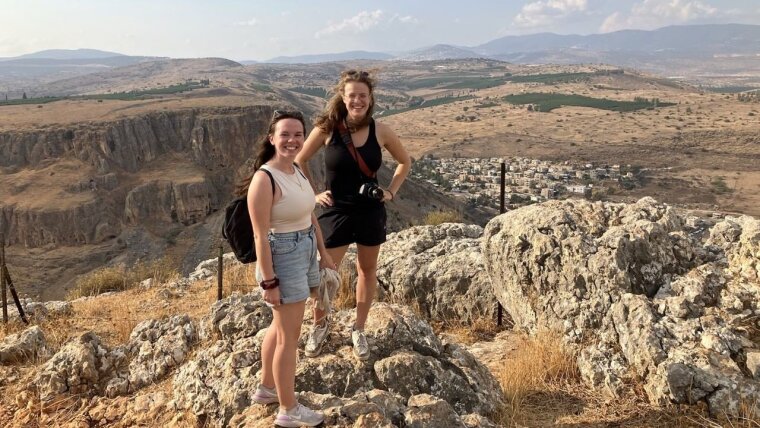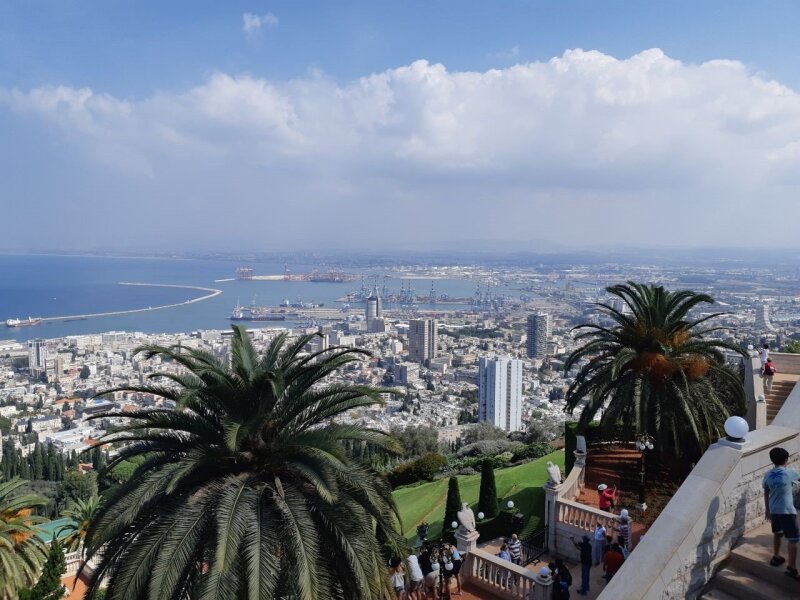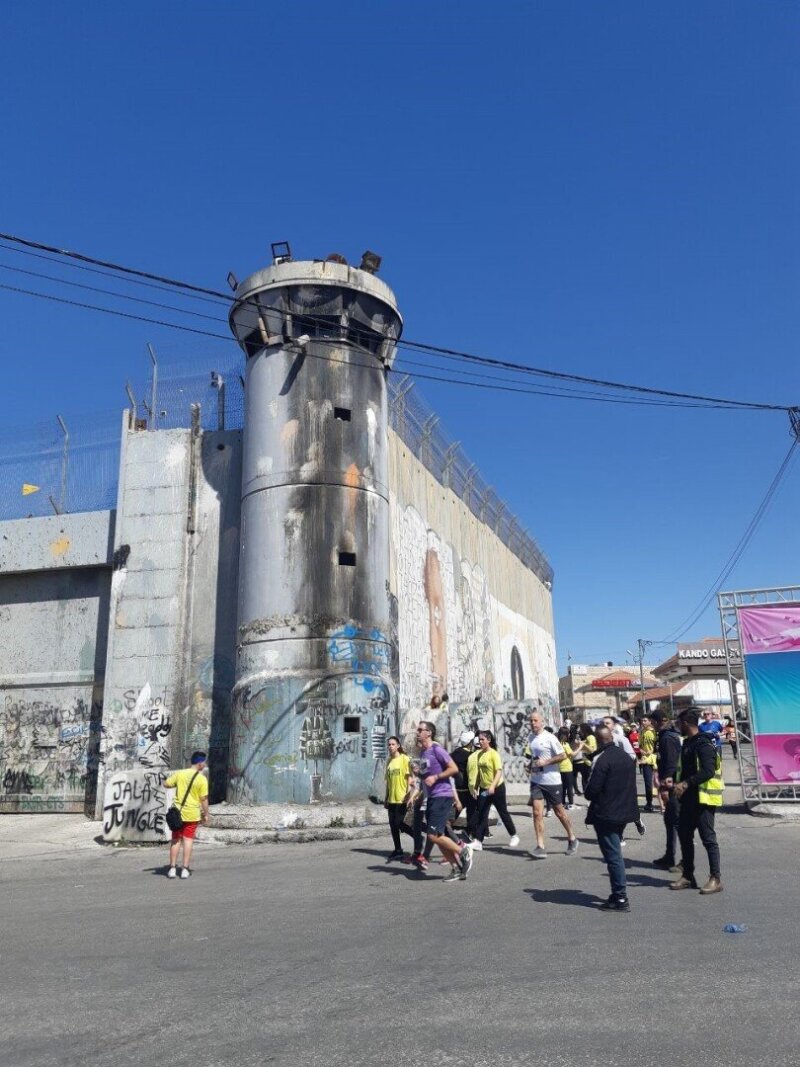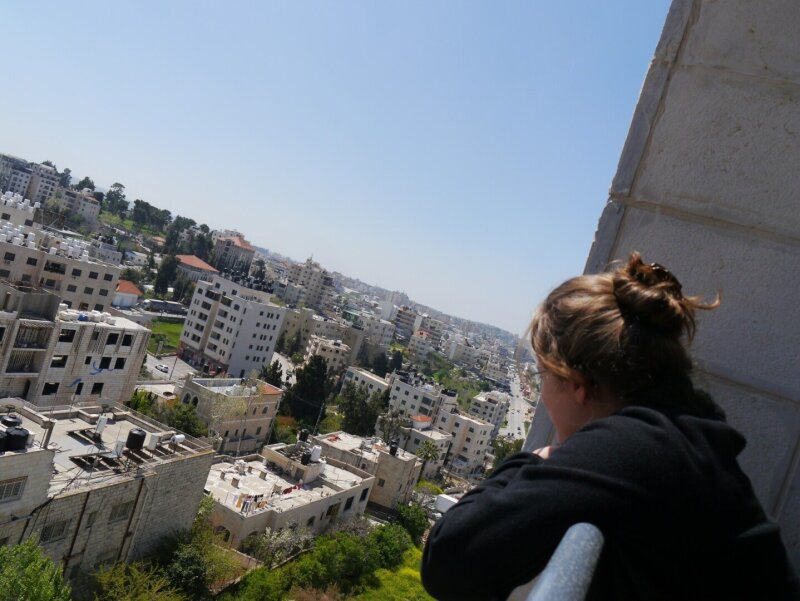
Meldung vom:
Myriel, Master International Organisations and Crisis Management
Report – Erasmus Semester in Haifa (Israel) and Internship in Ramallah (Palestine)
My name is Myriel, in the Winter semester of 2022/2023 I stayed three months at the University of Haifa in Israel. After finishing the semester there, I continued with an internship in Ramallah, West Bank for another 2.5 months. This might not be the standard report for an Erasmus, but Israel is not a standard country either.
In my master’s degree at the University of Jena, doing a semester abroad is part of the regular curriculum, which obliged me to already apply to a university in my first semester of the degree. I wanted to go somewhere which was not too far from Germany but also not within Europe, additionally, Israel and Palestine are in the field of Peace and Conflict Studies somehow a ‘must’ know area that I am also very interested in.
Before applying, I asked around in the circle of my co-students to determine which university was best to choose. In the end, it was more a gut decision than the merits of the specific universities. Haifa was specifically recommended for our course since it offered a wide variety of courses in the field of peace and conflict studies, terrorism (as weird as that might sound), diplomacy, and international relations. Although I heard a lot of praise about the university in Be’er Sheva, the city is a bit far from everything and in the middle of the desert, which, for a person who doesn't love the heat that much, didn’t seem to be a great fit. Jerusalem was also an option; however, it's a place that's inevitable to visit anyway. Haifa was also the city where the chance of getting a room in the first place, and then one below 500 dollars per month, was possible. Thus, my first choice was Haifa, which I luckily also got admitted to, together with Sarah, another student from my class.
As soon as the confirmation mail from the International Office arrived, the hustle began. As with every semester abroad, there are a lot of things to organize, however, there were a few additional surprises. After applying to Haifa University separately and getting admitted, it turned out that we had to pay a fee of 800 USD within a week. It included the insurance for the semester in Israel ($300) and a compulsory social fee of $500. Both had to be paid in order to study in Haifa. Afterward, we heard from students in Jerusalem that they managed to not pay the insurance and didn’t have to pay the social fee. Since I got to test the Israeli health system (which is pretty good!), in retrospect, I recommend getting the insurance; it just makes things easier...
We grudgingly accepted this fact and moved on to the question of visas. To study in Israel, you have to get a student visa (officially); however, the Israeli foreign ministry had been striking for months, and there were no visa stamps to issue them, at least not in the embassy in Berlin. Eventually we managed via Munich; also here, as a recommendation (as with everything in Israel), perseverance is key; if you call five times, you might get different answers five times, and, in the end, it’s not as strict as it seems. While people holding a German passport can enter Israel without a visa, having one with multiple entries allows you to leave for Jordan and Egypt and come back in with (mostly) less hustle.
Having settled everything with the authorities, we started looking for accommodation. Everything goes through Facebook groups, and often things can be organized within two days. The dorms are recommendable for people who prefer a quieter life or hike a lot (the university is in a nature reserve); otherwise, they are far from the city. Since our classes were mostly once a day, it was more attractive to commute to the university than to the city. I found a room in a shared flat in the city and could explore Haifa from there. I also had an Israeli roommate who I could hang out with.
Sarah and I booked our flights together (with a pre-issued visa, it’s apparently impossible to enter Israel via land since they must be validated at Ben Gurion Airport) and arrived a good week before the start of the semester. This gave us time to settle a bit, discover Haifa, and travel to Jerusalem and Tel Aviv.
Blick über Haifa
Foto: Myriel, Uni JenaAt the start of the semester, we spent the first three weeks trying to be admitted to classes that actually belonged to our field of study. However, as we found out upon arrival, being an international student at the University of Haifa means not actually studying at the university but at a separate entity – the international school. Courses for exchange students are only offered here and cannot be taken by regular students of Haifa University, nor can exchange students easily access classes at the University of Haifa. The international school offers regular classes every semester for exchange students and international master's programs. When applying to Haifa, we were told that we could also choose classes from these programs if we wrote separate applications to the heads of the respective programs. Me choosing Haifa was also due to the offer of these classes; due to their relevance for our field of study, Haifa was recommended for the IOCM program.
As we found out after weeks of trying to get into the courses, we had to accept that being ‘not-paying’ international students (and only in Haifa for one semester) made it virtually impossible to be admitted. We thus had to choose two random classes just to have enough credits at all. In addition to our limited interest in their topics, normal classes in Haifa usually last up to 4.5 hours and are oftentimes frontal lectures with virtually no breaks. This, of course, doesn’t help concentration or motivation. Our other two classes, however, terrorism and Arabic, were very good; we made several study trips and had very engaged lecturers.
The semester passed fairly quickly since we had approximately one class a day. The rest of the time we spent discovering Haifa or co-working in cafés. On the weekend, we went on trips, some of which were organized by the university, to, e.g., the Golan Heights, the Dead Sea, and Masada, or went hiking. ‘Integrating’ into Israeli society proved quite difficult for me – even with my flatmate and high motivation at the beginning. The contact with local students at the university was nearly nonexistent, since our classes were at the international school. I tried to find a sports club, which, except for gyms, was nearly impossible, and after two months I gave up. Apart from an occasional dinner, we thus mostly spent our time with other international students or just Sarah and me.
Since there was not a lot to attend at university, we travelled a lot on our own during the week(-ends). These trips led us to remote areas in Israel, but also Jordan and the West Bank (Sea of Galilea, Amman, Jerusalem, Bethlehem etc.). We also took part in study trips to Hebron and the Gaza Border with Breaking the Silence or Extent. Here, I have to mention that entering the West Bank is officially prohibited by Haifa University, while you are enrolled there. I cannot say for sure why and know of no issues in this regard, but it must be kept in mind – I nevertheless absolutely recommend going there.
Except for the Arabic exam, we had mostly term papers to do, which could be finished until up three weeks after the semester ended. Since both our student visas expired at the end of January, we had to leave the country – Sarah for an internship to Germany and me to Jordan. I planned to come back on a tourist visa to do internship in Israel/Palestine. Already in October I had applied for an internship at EcoPeace Middle East, an organization which works with Environmental Peacekeeping in Israel, Jordan and Palestine. I received an offer to work in their Palestine office in Ramallah and got funding from the University of Jena via the ICM Internship program which I also had applied to in advance.
After my three months in Haifa, I thought that I had developed at least a hint of an understanding what living in Israel felt like. The feeling I had then I would describe as ‘burdened’. I attributed this to my high exposure to the conflict situation between Israel, Palestine, Jordan and Lebanon due to my classes and trips. But still, life in Haifa was ‘normal’ in a way – I went to cafes, the beach and museums or spent my time studying like I would in Germany.
Marathon entlang der Mauer in Bethlehem
Foto: Myriel, Uni JenaHowever, the three following months in Ramallah were on a next level. I am happy not to have missed it, but they were the most intense experience in the exchange and left their mark. The days before and after my arrival were marked by military raids across the West Bank, protests against the judicial reform in Israel and strikes in several Palestinian cities. The earthquake(s) in Turkey and Syria followed, completed by more military raids in Nablus, demolitions, and evictions. Later came rockets from Gaza and Lebanon on the Golan Heights, bombs attacks on checkpoints or stabbing attacks in Tel Aviv or Jerusalem. Many things often happened only moments after I was there – my use of social media changed from entertainment to a source of vital information about safe/unsafe roads or closed areas. Living and working in Ramallah meant not only being exposed to what happened in the West Bank, but also having to follow the events within Israel – more than I had in Haifa – since they had a direct impact on our life too. Ramadan and the judicial reform (and its protests) didn’t really contribute to ease up.
In Ramallah I found a room within a few days, a sports club within a week and friends within seconds. The living circumstances in Ramallah were in some ways different from Haifa – traveling was lengthy and tedious, climbing or hiking trips had to be planned away from settlers and most of the time I wasn’t working since everyone was (involuntarily) on strike. The contact with the people was direct and I spent nearly every evening either cooking, eating out or playing games – all the while discussing political issues. The prices definitely also played a role – the only thing which is cheap in Israel was public transport, while more was affordable in the West Bank. While the circumstances were not fun, on a personal level I am very happy to have done my internship there. I learned a lot about the peacekeeping work in the region, its struggles, but also got an idea of what used to be a rather blank spot on the map when living in Haifa.
Blick auf Ramallah
Foto: Myriel, Uni JenaWhen I left Israel and the West Bank after six months, I was in a way relieved to get out of there in one piece, but also drawn back to it – due to the friends I made in Ramallah and Haifa, the food (which I surprisingly haven’t mentioned before) and the oh-so-many issues I have yet to learn about. If I can, I would love to return. Not because of my academic experience, but because of the diversity this region has to offer, the people and their hope which nevertheless persists. If you are interested in Haifa or Israel, don’t be deterred by non-existing replies to emails (WhatsApp works instead), weird rules or bureaucratic hurdles. The nature, the people, the history (and its relation to Germany), the food, the discussions and everything else is definitely worth it.


